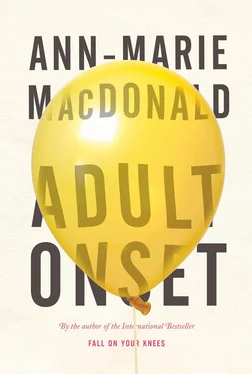Dear Dad,
I wonder if Mum’s problems with postpartum depression informed the fury with which she responded to my coming out years later.
She may have been consumed with guilt and anxiety because of all she had been through, and perhaps she believed she had damaged me somehow — especially during the very sad aftermath of Alexander’s birth and death when she would have been hard-pressed to focus her attention on an energetic toddler — and that this was how the damage was coming out … as it were
Delete .
She closes her laptop, scrubs the porridge pot, calls, “Maggie!” and experiences an audible click as a logical conclusion in the form of a question arrives in her consciousness after a journey of forty-three years: If I thought Andy-Patrick would have to be put in the ground if he was named after a dead brother, where did I think I was, having been named after a dead sister?
Scour, scrub, scrape, “Maggie!”
She is going to go down to Postal Station E and give some petty bureaucrat a big thorny piece of her mind. Why seek out bad drivers upon whom to vent one’s spleen when there is a Crown corporation to hand? Fucking posties, fucking pensions and benefits and backaches. She swings round with the pot and almost clocks the child on the head. “Maggie! Thank you for coming when Mumma called, sweetheart.”
Her daughter looks extra pretty today for some reason, like a little candy apple blossom. “Hey, cutie-pie, wait’ll Mummy comes home and sees how much you’ve grown!”
They will have a nice walk to the post office. They will take Daisy. They will show the postal people what a nice dog she is. Mary Rose will submit the form like a good citizen. The post office will release the mail. The suspense will end, her mother will shut up. They will stop in the park. They will have a nice time. She is a nice mother. See Jane put on her boots.
Maggie sits on the step. Mary Rose stations herself below and takes hold of one little foot with one hand and one little running shoe with the other.
“Boots,” says Maggie.
“No problemo! Do you want the ladybugs?”
“Yes, Mumma.”
Mary Rose turns to the crowded rack and spots a single shiny red boot wedged at one end. She frees it — the left one, where is the right one?
“Where’s your other ladybug boot, baby-girl?”
She starts hunting for it. It is not in the basement. It is not in the backyard. It is not in the bottom of the stroller, it is not in the car. Where oh where is Jane’s other boot? Other Boot, Other Boot, fly away home! Mary Rose sighs. Where does a boot go? Does it walk away on its own? Fiendishly skipping off to Hell? It is still not in the boot rack. Where the fuck is it? She kicks through the jumble of footwear that Maggie has obviously ransacked in an effort to be helpful, and with every kick she feels the tide of anger rising— do not fill above this line . Relax, it’s a boot, not a priceless heirloom.
“Mumma can’t find your other ladybug boot, Maggie, you’ll have to wear these ones.”
The Bean boots with safety reflectors.
“No, Mumma, I will wear Sitdy boots.”
“I’m so sorry, sweetheart, I can only find one.” This is a grammatical infelicity, it ought to be I can find only one , otherwise only is modifying find —
“I can find one, Mumma.”
“You’re such a good girl!” With that, she takes Maggie’s right foot and, gently but firmly, begins to pull the ladybug boot off it. Maggie goes rigid, shoots out her leg, and her heel finds her mother’s left nipple. Mary Rose releases her hold. She smiles, unruffled. It really does get better . “Okay, sweetheart, you can wear one of each.” Pleased with her patience, she hands Maggie a Bean boot. Maggie throws it at the wall.
“STOP IT!” roars Mary Rose, corralling the bucking ankles, “NO!” grabbing the flailing hands, wrists, arms, “DON’T YOU FUCKING HIT ME!” She is sobbing the words with a force of violence she is diverting from her hands, “I’M GOING TO SMASH YOU!” Stop .
Maggie is still struggling. Is that a good sign? Mary Rose’s hands are still around her daughter’s arms, her knees imprisoning her daughter’s knees, angry Madonna and child. Maggie is whimpering now, wriggling more than fighting.
It is not that sound has deserted the air, it is that each sound issues briefly from a void into which it promptly returns. Dead. It is as though Mary Rose were hearing everything from behind glass. The air itself has changed such that time cannot pass through it, must go around it instead. It is separate in here. Sterile.
Her hands are still around her daughter’s arms. Her hands can feel the small bones within their sleeves of flesh, bones like flutes. She watches her hands as, without warning, they pulse. Maggie screams. The hands loosen their grip but do not let go. They remain like manacles, encircling the arms. Like paper chains on a Christmas tree. She watches the hands: what will they do next? Something is going to happen, she cannot remember what.
A bark from upstairs, a thundering descent followed by clacketing across the kitchen floor. The dog appears at the top of the steps, stops and looks at her.
“It’s okay, Daisy, it’s just Mumma.” Mary Rose hears her own voice as though it belongs to someone else, someone who has arrived just in time. The dog growls. She lets go of Maggie. But the dog remains planted, ears pricked, eyes fixed.
Maggie is staring up at a corner of the ceiling. Mary Rose understands she is feeling fear when she hears herself cry, “Maggie?!”
The child is in a trance.
“Maggie!” Is she breathing?
She lowers her gaze and looks at Mary Rose, her expression blank. She is not breathing. Mary Rose picks her up and, as though kick-started by the movement, breath rushes back in the form of a gasp and a scream. She clings to Mary Rose like a monkey, so hard. She hangs on and cries so hard, hanging on to Mumma.
•
How do you heal time?
•
Mary Rose watches Maggie climb into the stroller and do up her own buckle. She is wearing the ladybug boots. The child was right when she said, “I can find one.” She had found it, buried in the boot rack all along, she had even been attempting to put it on the correct foot. Mary Rose feels bad as she watches her child patiently manipulate the buckle, her little face tear-stained but content now, and she feels something else too: love. She closes it promptly — like a laptop. She is sufficiently aware to know that accessing love on the heels of rage is not right, it is part of an abusive dynamic. Having ticked that box, she gets on with the day.
The day the daytheday the day is too bright. there are sequential actions that add up to sanity going for a walk to the post office is one of them just do these correct things no one needs to know that you are untethered maybe everyone is. and then andthenand then prepositions grafting one thought to another if they take you have continuity if not you have fractured bits
They go out by the back gate, down the driveway, onto the sidewalk along the peterpiperpickedapeckofprepositions what if she just keeps walking? One day I’ll walk out of the house and never come back . Daisy lifts her leg and pees on the corner of the fence where the indestructible cosmos will soon spring back to life. Mary Rose sees Rochelle getting into her Tercel. “Hi, Rochelle!”
Rochelle does not immediately return the greeting.
“Isn’t it an amazing day?” chirps Mary Rose.
“It’s nice.” Rochelle sounds wary.
“We’re going for a hike. We’ve got snacks, we’ve got juice, we even have our sled dog in case it snows again! We’re all set, aren’t we, Maggie, can you say hi to Rochelle?” Something is wrong with Mary Rose’s face.
Читать дальше












